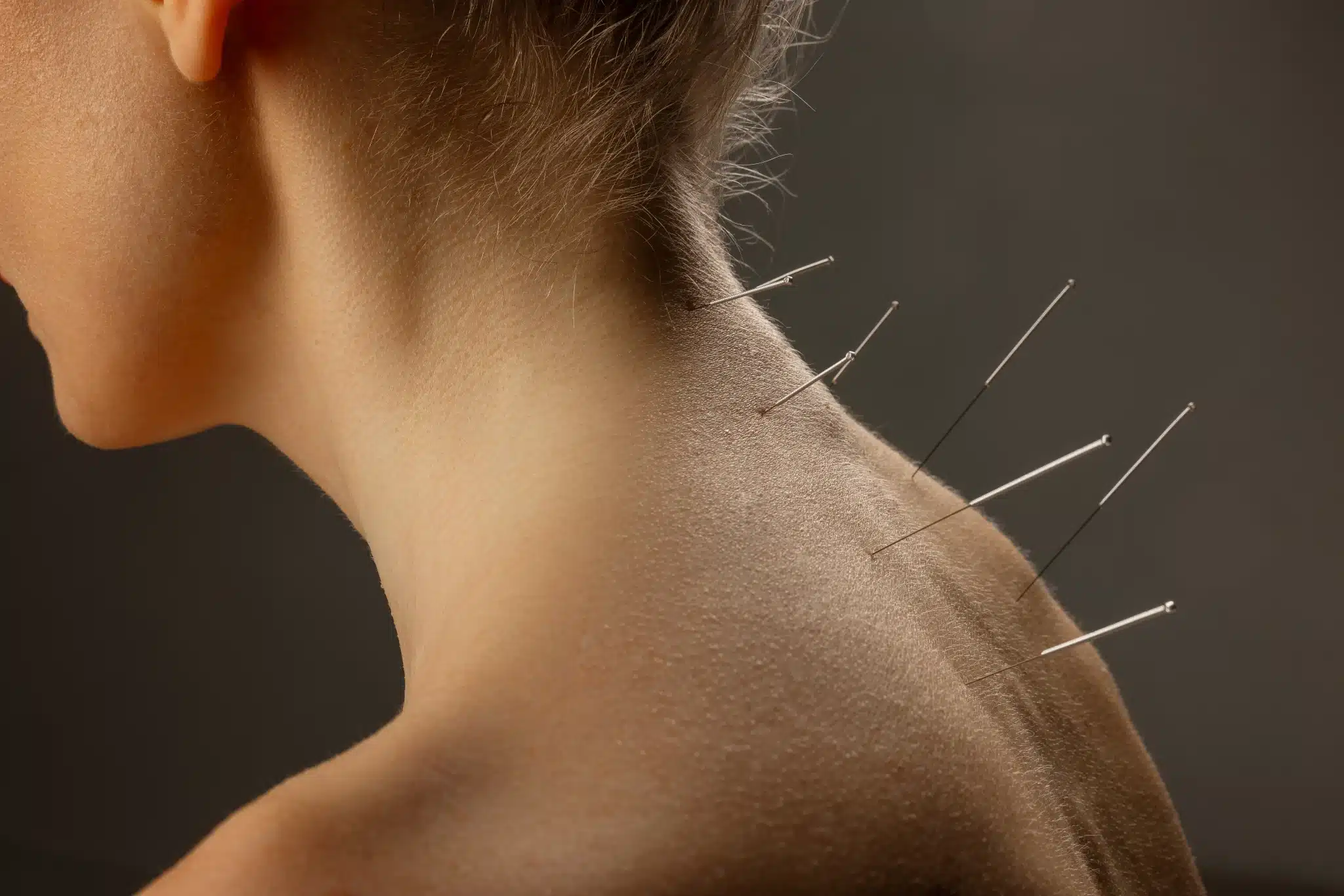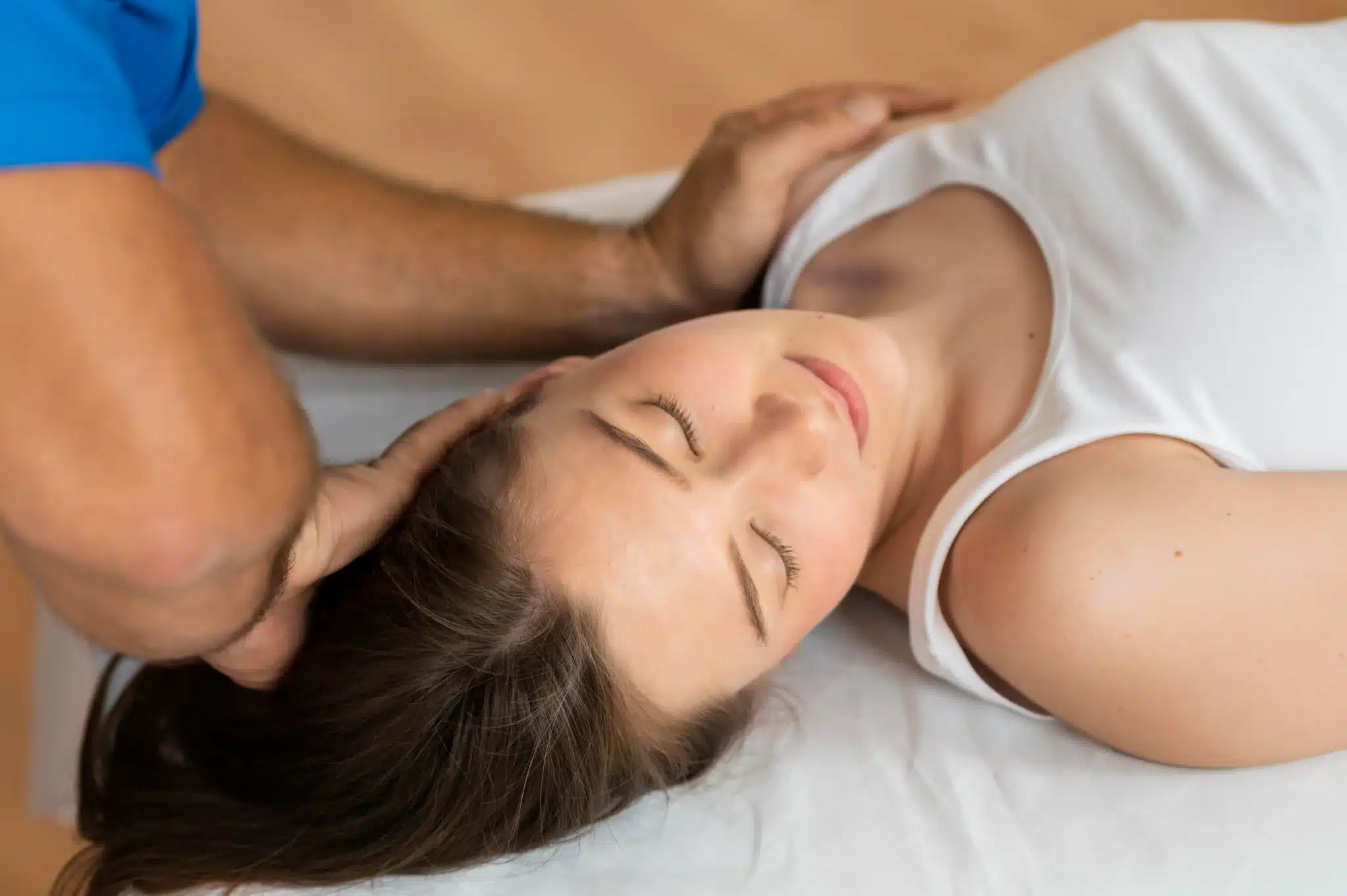Have you ever wondered if there's an alternative solution to chronic lower back pain that even modern biomedicine seems to struggle with?
A serene room with a traditional acupuncture setup, featuring a comfortable massage table, neatly arranged acupuncture needles, soft ambient lighting, and calming natural elements like plants and stones. In the background, a detailed anatomical representation of acupuncture points for chronic lower back pain, highlighting specific areas with gentle illumination. The overall atmosphere conveys tranquility and healing.
Traditional Chinese medicine sees lower back pain as a common problem. It suggests using acupuncture as a good treatment. Applying acupressure to the Lumbar Pain Point or Yaotongxue, found on the back of both hands, can help a lot.
Stimulating these acupuncture points for chronic lower back pain regularly can help with muscle spasms and improve movement. This makes it a good choice for those with ongoing pain. Recent studies show acupuncture might be better than some pain medicines, offering a natural way to manage chronic lower back pain (m54.59).
Key Takeaways
- Chronic lower back pain affects millions and is often resistant to conventional treatments.
- The Lumbar Pain Point, located on the back of both hands, is crucial for relieving acute lower back pain.
- Applying pressure to these points for about a minute can reduce pain and muscle spasms significantly.
- Acupuncture offers a holistic approach to pain management with fewer side effects compared to some medications.
- Studies have shown that around 50% of chronic pain sufferers report improvement after acupuncture treatments.
- Patients often see notable improvements in range of motion after a few acupuncture sessions.
- Acupressure, a practice nearly three millenniums old, remains a cornerstone of traditional Chinese medicine for pain relief.
The Prevalence and Impact of Chronic Lower Back Pain
Chronic lower back pain affects many people worldwide. It impacts both individuals and society. Up to 84% of people have low-back pain at some point. Causes include mechanical spinal disorders, leading to symptoms like sciatica and hip pain.
Traditional treatments have improved, but acupuncture therapy is gaining popularity. It's seen as a conservative and cost-effective pain management option.
Understanding Chronic Lower Back Pain
The history of treating chronic lower back pain is long. The Lancet Commission noted back pain from railway injuries as early as 1862. In the early 20th century, Goldthwait and Osgood found that S-1 joint mobility could cause pain.
By 1926, sacroiliac fusion was reported to have a 90% success rate in pain relief.
A serene illustration of a human silhouette in a meditative pose, with highlighted acupuncture points along the lower back, surrounded by soft, flowing waves of light and color representing pain relief and tranquility, set against a calming background of nature elements like gentle hills and soothing clouds.
The Economic and Social Costs
The impact of chronic lower back pain is huge. In the UK, 40% of adults reported back pain lasting over a day in the past year. 13% of unemployed people blame back pain for their job loss.
This creates financial stress and affects well-being. Healthcare systems bear a big burden. Many turn to acupuncture therapy, which has shown promise in managing pain.
| Study | Year | Finding |
|---|---|---|
| The Lancet Commission | 1862 | Attributed back pain to railway travel. |
| Goldthwait and Osgood | Early 20th century | Linked S-1 joint mobility to pain. |
| Sacroiliac Fusion Study | 1926 | 90% success rate in pain relief. |
| Mixter and Barr | 1934 | Shifted focus to the intervertebral disc in chronic lower back pain treatment. |
| Acupuncture Trials | Recent | Showed twice the effectiveness of acupuncture compared to conventional therapy. |
The Science Behind Acupuncture for Pain Management
Understanding how acupuncture works is key to seeing its benefits. It uses Qi, the energy force, to clear blockages. This helps to ease pain and improve overall health.
How Acupuncture Works
Acupuncture has been perfected over centuries. It stimulates the nervous system, releasing natural painkillers like endorphins. Studies show it's effective, with benefits lasting over a year after treatment.
- Meta-analysis encompassed 20,827 patients over 39 trials
- More than half of the trials (23) utilized traditional Chinese techniques
- 80% of trials had sessions ranging from six to 15 acupuncture appointments
- The majority of patients received treatments one to two times per week

A serene acupuncture treatment room with soft lighting, a comfortable treatment table, and a wall adorned with human anatomy charts highlighting acupuncture points, needles delicately placed on a model's lower back, surrounded by calming elements like plants and stones, evoking a sense of tranquility and holistic healing.
Studies with 2,905 participants also confirm its benefits. But, it's not just the needles that help. Other factors also play a role in acupuncture's success.
Evidence-Based Benefits
Acupuncture is proven to help with many conditions. It's good for headaches, fibromyalgia, and osteoarthritis. It also helps with low back pain, carpal tunnel syndrome, and asthma.
It's not just for pain. Acupuncture also boosts physical and emotional health. It helps with depression and anxiety too.
| Condition | Benefit of Acupuncture |
|---|---|
| Chronic Pain | Relief for arthritis, low back pain |
| Digestive Issues | Benefits for gastritis, hepatitis |
| Emotional Ailments | Assistance with anxiety, depression |
| Gynecological Problems | Relief from menstrual pain, infertility |
| Neurologic Conditions | Support for Parkinson's disease, headaches, migraines |
| Respiratory Problems | Help with bronchitis |
Even though acupuncture is widely accepted, it's still hard to get. This is because doctors aren't always trained in it, and insurance often doesn't cover it. Yet, with ongoing research, acupuncture remains a recommended treatment for many conditions.
Targeted Acupuncture Points for Chronic Lower Back Pain
Chronic lower back pain can be managed with targeted acupuncture. It uses traditional Chinese medicine points like BL 40, GB 34, ST 36, KI 7, and LR 5. These points are chosen based on the specific pain conditions.
The treatment focuses on both localized and widespread pain. This ensures a comprehensive approach to reduce discomfort.
Back pain is common, affecting almost everyone at some point. Targeted acupuncture is a popular treatment. It combines traditional Chinese medicine points with modern pain management.
Substance practitioners use techniques like Battlefield Acupuncture for back pain. These methods involve needling and stimulation.
The fascia is key in myofascial pain, often seen in low-back pain patients. Acupuncture needle rotation affects the fascia directly. This aligns with classical Chinese texts on the body's networks.
Touch and palpation are vital in acupuncture. They help in applying treatments precisely. Methods like Gua sha are also effective in pain relief and healing.
This combination of approaches makes targeted acupuncture effective for chronic lower back pain.
| Study Review | Number of Participants | Results |
|---|---|---|
| Acupuncture vs. Sham Intervention | 1403 (7 trials) | Low-certainty evidence suggests acupuncture may relieve pain immediately (MD -9.22) |
| Acupuncture vs. No Treatment | Total not specified | Moderate-certainty evidence shows greater pain relief (MD -20.32) & improved back function (SMD -0.53) |
| Usual Care Comparison | 1054 (5 trials) | Low-certainty evidence indicating reduced pain (MD -10.26) and improved back-specific function |
| Overall Study Demographics | 8270 (33 studies) | Conducted mainly in Europe, Asia, North & South America; Germany accounted for 67% of participants |
Targeted acupuncture and trigger-point deactivation are promising for chronic lower back pain relief. Integrating traditional Chinese medicine points into modern treatments offers a holistic approach to pain management.
Holistic Benefits of Acupuncture Treatment
Acupuncture does more than just ease pain. It offers many health benefits, improving both physical health and overall well-being. It helps with better mobility and less inflammation. These benefits can lead to a better life and might reduce the need for pain medicines.
Improved Mobility
Acupuncture makes moving easier. This is because it relaxes muscles and boosts blood flow. A 2021 study found acupuncture helps with pain, makes self-care easier, and reduces pain medicine use for back pain.
This makes daily tasks simpler, showing acupuncture's value in improving health.
Reduction in Inflammation
Acupuncture also fights inflammation, a cause of chronic pain and health problems. A 2018 review showed acupuncture creates small injuries that release ATP. This blocks pain receptors, easing pain.
Regular acupuncture can reduce inflammation, offering relief from chronic conditions. With services like those from Holistic Billing Services, patients get treatments for full healing and well-being.
FAQ
What are the common acupuncture points for chronic lower back pain?
Common points include the Lumbar Pain Point (Yaotongxue), BL 40, GB 34, ST 36, KI 7, and LR 5. These points help with muscle spasms and improve movement. They also provide significant pain relief.
How prevalent is chronic lower back pain globally?
Up to 84% of the world's population will experience chronic lower back pain at some point. It often comes from mechanical spinal disorders. Symptoms include sciatica, hip pain, and groin pain.
What are the socio-economic impacts of chronic lower back pain?
Chronic lower back pain has big socio-economic costs. It causes personal losses and financial stress. Treatment costs and lost workdays add to the burden. It's now focusing on less invasive treatments.
How does acupuncture work to relieve pain?
Acupuncture manipulates Qi to relieve pain by clearing blockages. It affects the central nervous system, releasing endorphins. This reduces pain and improves health.
What evidence supports the effectiveness of acupuncture for pain management?
Studies and clinical cases show acupuncture reduces pain and improves movement. It's a cost-effective, low-risk option for pain management.
Which targeted acupuncture points are effective for chronic lower back pain relief?
Effective points include BL 40, GB 34, ST 36, KI 7, and LR 5. These are chosen based on symptoms, offering targeted relief.
What holistic benefits does acupuncture treatment offer?
Acupuncture offers more than pain relief. It improves mobility, enhances circulation, and reduces inflammation. Regular treatments can lead to a better life and less reliance on pain meds.
Can acupuncture improve mobility for those with chronic lower back pain?
Yes, acupuncture can improve mobility. It reduces muscle tension and enhances circulation. This leads to better movement and range of motion.
How does acupuncture help in reducing inflammation?
Acupuncture reduces inflammation by improving circulation and balancing Qi. This decrease in inflammation helps with pain relief and overall health.
ChiroTouch Billing: Simplify Your Practice Finances
Source Links
- Acupuncture Points for Acute Low Back Pain
- Acupuncture for Back Pain: Does it Work?
- 6 Self-acupressure points to relieve back pain - Blue Tree Massage
- Acupuncture for Low-Back Pain - PMC
- Acupuncture therapy for chronic lower back pain: a systematic revie -
- Research Finds Acupuncture Effective for Chronic Pain
- Acupuncture
Want to know more? Check out our related articles
Chronic Back Pain Acupuncture: Natural Relief Option
M54.59 Diagnosis Code: Understanding Back Pain
M54.59 ICD 10 Code: Understanding Radiculopathy
Understanding Lumbosacral Back Pain





